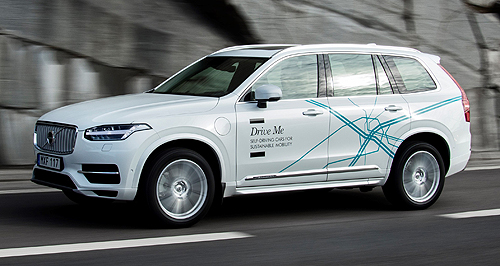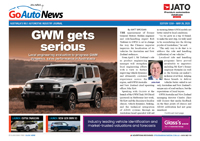News - VolvoVolvo and Uber announce autonomous fleet dealTaxi driverless: Volvo will contribute tens of thousands of XC90 self-driving prototypes to Uber between 2019 and 2021. Tens of thousands of autonomous-compatible cars to be supplied to Uber by Volvo21 Nov 2017 SWEDISH car-maker Volvo has announced a partnership with Uber that will see it introduce tens of thousands of self-driving vehicles into the ride-sharing service's fleet between 2019 and 2021. The base fleet vehicles will be built on Volvo’s Scalable Product Architecture (SPA), which underpins its larger models like the XC90 large SUV and recently released XC60 mid-size SUV, as well as the S90 sedan and V90 wagon. Volvo has confirmed that the XC90 will be used as a fleet vehicle, with engineers from the manufacturer teaming up with Uber engineers to develop self-driving versions of the family-orientated model. The partnership between Volvo and Uber begun in August 2016, when the two companies announced they would be pooling their resources into developing a fully autonomous self-driving vehicle. Volvo’s SPA platform initially stood out to Uber as it was designed from inception to be able to accommodate autonomous technologies, electrified powertrains and connectivity solutions. In September 2016, Volvo commenced its Drive Me autonomous testing program, in which a fleet of XC90s were handed out to families in Gothenburg, Sweden for hands-free autonomous driving testing. The first Volvo/Uber on-road testing commenced with a driverless XC90 on the streets of Pittsburgh and later San Francisco, however the Californian trial was marred by hiccups after the pilot vehicle was seen running red lights. In March this year, the testing program was suspended indefinitely after an accident in Tempe, Arizona that saw the XC90 test mule flipped on its roof. It was determined that the Volvo was not at fault, however, as a separate driver failed to yield at an intersection when the XC90 had right of way. The base vehicles to be supplied to Uber come fitted with the necessary safety, redundancy and autonomous technologies that are required for Uber to add its own self-driving technology that it has been developing. Volvo is also using the same base vehicle to develop its own fully autonomous car, which it is expected to release to the public by 2021. Volvo Cars president and chief executive Hasan Samuelsson said the company was keen to seize on the opportunity presented by a changing automotive landscape. “The automotive industry is being disrupted by technology and Volvo Cars chooses to be an active part of that disruption,” he said. “Our aim is to be the supplier of choice for autonomous drive ride-sharing service providers globally. “Today’s agreement with Uber is a primary example of that strategic direction.” Uber head of auto alliances Jeff Miller said the new deal puts Uber one step closer to mass production of self-driving vehicles. “We’re thrilled to expand our partnership with Uber,” he said. “This new agreement puts us on a path towards mass produced self-driving vehicles at scale.”  Read more27th of March 2017  Uber’s autonomous testing takes a tumbleSelf-driving program from Uber put on hold after test mule crash15th of December 2016  Volvo and Uber San Fran trial hits early speed bumpAutonomous Volvo XC90s run red lights in San Francisco trial: report |
Click to shareVolvo articlesResearch Volvo Motor industry news |















Facebook Twitter Instagram